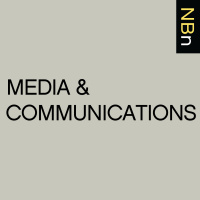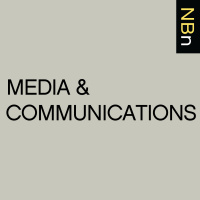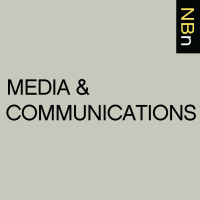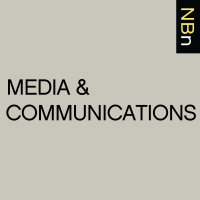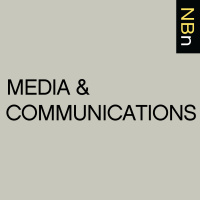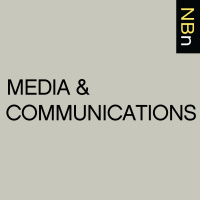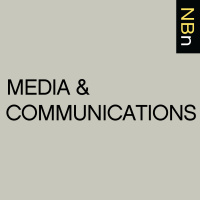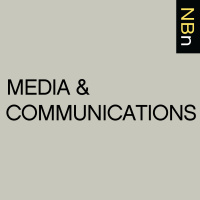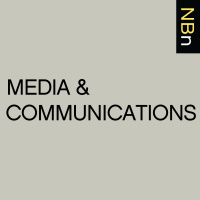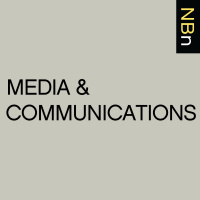Sinopsis
Interviews with Scholars of Media and Communications about their New Books
Episodios
-
Brian T. Edwards, “After the American Century: The Ends of U.S. Culture in the Middle East” (Columbia UP, 2016)
06/03/2017 Duración: 58minAmerican culture is ubiquitous across the globe. It travels to different social contexts and is consumed by international populations. But the relationship between American culture and the meanings attached to the United States change over time. During the 20th century, the American Century, American culture generally aided in the positive global perception of U.S. policies and governance. In After the American Century: The Ends of U.S. Culture in the Middle East (Columbia University Press, 2016), Brian T. Edwards, Crown Professor in Middle East Studies and Professor of English at Northwestern University, demonstrates how this relationship altered in recent decades. Technological innovation and the emergence of the digital age have drastically changed the nature of cultural circulation and production. Edwards explores the innovative play between global culture and local subjects in Egypt, Iran, and Morocco. He explores the exchange and interpretations between multiple publics that engage culture situated wit
-
Dave Karpf, “Analytic Activism: Digital Listening and the New Political Strategy” (Oxford UP, 2016)
09/01/2017 Duración: 31minFor the start of 2017, Dave Karpf is back on the podcast with his new book, Analytic Activism: Digital Listening and the New Political Strategy (Oxford University Press, 2016). Karpf is associate professor of media and public affairs at The George Washington University and author of The MoveOn Effect also published by Oxford. Much of the attention paid to digital politics is about speech. What did Donald Trump say on Twitter today? And who responded? Karpf’s book suggest that that attention has overlooked the other side of digital politics: listening. In Analytic Activism, Karpf focuses on how organizations use the digital footprints we all leave online to inform strategy. A/B testing and digital petitions allow political groups to hear what constituents care about and then later to use that information to mobilize and drive action. Learn more about your ad choices. Visit megaphone.fm/adchoices
-
Nicholas A. John, “The Age of Sharing” (Polity Press, 2016)
06/01/2017 Duración: 47minIn his new book The Age of Sharing (Polity Press, 2016), the sociologist and media scholar Nicholas A. John documents the history and current meanings of the word sharing, which he argues, is a central keyword of contemporary media discourse. John interrogates the rhetorical work that sharing does as a practice, a form of communication and a business model. He argues that in the last decade, sharing has come to dominate the way we think about our online activities, and indeed, the way we live. He demonstrates, how the therapeutic culture that defined the twentieth century, now shapes how we perceive and discuss our personal and economic interactions both online and offline. Moreover, it was the therapeutic discourse that informed and energized the shift from sharing as a distributive practice of material objects to the ethos of sharing as caring. John combines a close analysis of social media sites such as Facebook and businesses such Airbnb with a linguistic analysis of the genealogy of the concept of sharin
-
Brian Eugenio Herrera, “Latin Numbers: Playing Latino in Twentieth-Century U.S. Popular Performance” (U. Michigan Press, 2015)
10/12/2016 Duración: 58minIn Latin Numbers: Playing Latino in Twentieth-Century U.S. Popular Performance (University of Michigan Press, 2015) Brian Eugenio Herrera examines the way in which Latina/o actors have communicated and influenced ideas about race and ethnicity in the U.S. through their performances on the stage and screen. Introducing the concept of the “Latin number,” Dr. Herrera analyzes a series of overlapping historical moments from 1930 to 1990 when media and audiences became fascinated with Latinas/os and their potential impact on U.S. society. As a fleeting phenomenon, in which the U.S. public rediscovers, consumes, and then disregards Latinas/os, “Latin numbers,” Herrera explains, comprise a form of “spectacular entertainment” that perpetuates the myth of Hispanics as perennial novelties. Building on the work of cultural historians, Herrera also employs the concept of “playing Latino” to describe the more enduring effects of Latina/o popular performance on U.S. systems of racial classification and knowledge production
-
Tom Mills, “The BBC: Myth of a Public Service” (Verso, 2016)
02/12/2016 Duración: 42minThe BBC is often thought to be a great, impartial, defender of British values and society. In The BBC: Myth of a Public Service (Verso, 2016), Tom Mills, a lecturer in Sociology at Aston University, re-reads the history of the BBC to offer a more problematic status for the corporation, as an adjunct of British state power. The book uses examples from the General Strike in Britain, through war and economics reporting, to the vetting of left wing political attitudes within the Corporation, to tell the story of an institution that has been misunderstood by both left and right wing critics. Moreover, the book provides a critique of the management and organisation reforms to the BBC, coupled with a class analysis, demonstrating the need for transformation to this important part of British society. At a time when the media is under intense scrutiny for its perceived failures in reporting and representing politics and economics, Mills’ analysis and prescriptions for reform make for essential reading. Learn more abou
-
Mary Chapman, “Becoming Sui Sin Far: Early Fiction, Journalism and Travel Writing of Edith Maude Eaton” (McGill-Queens UP, 2016)
12/11/2016 Duración: 58minBecoming Sui Sin Far: Early Fiction, Journalism and Travel Writing of Edith Maude Eaton (McGill-Queens University Press, 2016) is a collection of works–previously published and newly discovered–produced by Edith Eaton, the writer whose literary status seems to escape the limitations of definitions and categorizations. Sui Sin Far is one of the pseudonyms Eaton invented: this gesture can also be presented as an attempt to escape the limitations of, so to speak, one life. Through compiling Eaton’s diverse oeuvre, Mary Chapman, the editor of the collection, presents her vision of Eaton, initiating the reconsideration of the stereotypical reading of Eaton as the writer who was interested predominantly in the exploration of the themes connected with Chinese immigrants in Canada and in the US. The current edition includes four main parts that present the trajectory of Eaton’s writing: “Early Montreal Fiction, Poetry, and Literary Sketches (1888-1891)”;” Selected Early Journalism: Montreal (1890-1896)”; “Selected E
-
Alecia Swasy, “How Journalists Use Twitter: The Changing Landscape of U.S. Newsrooms” (Lexington Books, 2016)
12/11/2016 Duración: 27minWith messages limited to 140 characters, Twitter once drew skepticism, even scorn, from journalists who saw little role for the social-media platform in their work. But as Alecia Swasy demonstrates in her new book, How Journalists Use Twitter: The Changing Landscape of U.S. Newsrooms (Lexington Books, 2016), many reporters now embrace Twitter as a means of cultivating sources, promoting stories and building their own “brands”as information providers. Swasy, a veteran business reporter who now teaches at Washington and Lee University, studied Twitter use at four metropolitan newspapers. She discovered that the humble “tweet”has become an integral component of a 24/7 news cycle in which reporters and readers engage in an ongoing conversation. James Kates is an Associate Professor in the Department of Communication at the University of Wisconsin-Whitewater. He has worked as an editor at The Philadelphia Inquirer, the Milwaukee Journal Sentinel and other publications Learn more about your ad choices. Visit meg
-
Kathryn Kleppinger, “Branding the Beur Author: Minority Writing and Media in France, 1983-2013” (Liverpool UP, 2015)
12/11/2016 Duración: 01h01minKathryn Kleppinger’s Branding the Beur Author: Minority Writing and the Media in France, 1983-2013 (Liverpool University Press, 2015) examines the “paradox of ethnic minority writing” in the work of multiple authors of North African descent over a thirty-year period. Organized chronologically as a series of portraits, the book’s chapters deal with the literary (and filmic) output of an impressive number of writers, including Mehdi Charef, Azouz Begag, Farida Belghoul, Soraya Nini, Samira Bellil, Rachid Djaidani,Faiza Guene, and Sabri Loutah. Considering literary works themselves, as well as the audio-visual media representation of texts and authors on French TV and radio, Kleppinger’s analysis pushes back against the tendency to understand “beur” literature in exclusively social and political terms at the expense of aesthetic or artistic readings. Drawing on a range of sources, from literature to television and radio archives, to interviews Kleppinger conducted with the authors themselves, the book weaves to
-
Ashaki Jackson, “Surveillance” (Writ Large Press, 2016)
09/11/2016 Duración: 14minNow in its fifth printing of a very short life, Ashaki Jackson’s Surveillance examines the relationship between acts of violence, the witnessing of violence, the witnessing of the witnessing of violence, and the internalization of all three. Media offers no escape from trauma, instead it creates a cyclical nature where the traumatized are re-traumatized and forced to live out fear after dread after terror. Written over the course of 3 months, Surveillance stretches the far-reaching arms of community to tap into a universal empathy. The collection nearly demands that this empathy exists, almost calls it into being through faith and continued presence. After reading this collection, I thought of the Nikki Giovanni poem Allowables which ends with: I don’t think I’m allowed To kill something Because I am Frightened Our own fear can pull us away from this universal empathy and understanding. The hyper-anxiety mode we are placed in by media rendering of violence, social media proliferation of those renderi
-
Alison N. Novak, “Media, Millennials, and Politics: The Coming of Age of the Next Political Generation” (Lexington Books, 2016)
06/11/2016 Duración: 29minThe millennial generation (those born from 1980 through the beginning of the 21st century) now comprises the largest voting bloc in the American electorate. In Media, Millennials, and Politics: The Coming of Age of the Next Political Generation (Lexington Books, 2016), Alison N. Novak argues that these 50 million young citizens are misunderstood, marginalized and sometimes overtly insulted by the news media. Writers, newscasters and pundits label them “apathetic, uninvolved and entitled,” while ignoring clear evidence that many millennials are deeply concerned about the course of the nation. Novak examines coverage of millennials in cable television and online news, finding that journalists often substitute stereotypes and rhetorical shortcuts for rigorous examination of how members of this generation think and act. She concludes by calling the media to task and demanding that it present a fuller, more nuanced picture of a group that will soon inherit the reins of power in the United States. James Kates is
-
Ethan Michaeli, “The Defender: How The Legendary Black Newspaper Changed America” (Houghton Mifflin Harcourt, 2016)
27/10/2016 Duración: 01h05minIn his new book The Defender: How The Legendary Black Newspaper Changed America (Houghton Mifflin Harcourt, 2016), Ethan Michaeli charts the riveting history of the Chicago Defender, one of the nation’s longest running and most significant black periodicals. Founded in 1905 by publisher Robert S. Abbott, the Defender came to play a central role in regional and national black politics; drawing African Americans north to Chicago as part of the Great Migration out of the South, condemning Jim Crow and bolstering the electoral power of black America, and helping to secure the election of presidents such as Harry Truman, John F. Kennedy and Barack Obama. Relying on exhaustive research, including dozens of interviews and extensive archival material, Ethan has constructed the most in-depth and illuminating history of the Defender ever published – highlighting not only the impact of publisher Abbott and iconic columnists such as Ida B. Wells and Langston Hughes, but also the hundreds of other journalists and editor
-
Lucas Graves, “Deciding What’s True: The Rise of Political Fact-Checking in American Journalism” (Columbia UP, 2016)
14/10/2016 Duración: 55minIn a fragmented media world where anyone can speak, professional journalists are no longer the “gatekeepers” who decide what the public will see and hear. Instead, citizens are barraged with claims, assertions and innuendo that have not been subjected to the journalistic discipline of verification. Fact-checking, pioneered by bloggers and developed by professional news organizations, attempts to get at the elusive truth by subjecting political figures’ words to careful scrutiny. In Deciding What’s True: The Rise of Political Fact-Checking in American Journalism (Columbia University Press, 2016) Lucas Graves examines the fact-checkers’ work and plumbs its potential, its limits and its hazards. He concludes that fact-checking, while imperfect, is a genuine reform movement that is reshaping American journalism and the long-cherished ideal of objectivity. James Kates is an Associate Professor in the Department of Communication at the University of Wisconsin-Whitewater. He has worked as an editor at The Philade
-
Noah Shenker, “Reframing Holocaust Testimony” (Indiana UP, 2016)
07/10/2016 Duración: 01h17minI serve on a planning committee for the annual Holocaust Commemoration in Wichita, where I live and teach. Every year when we convene, we remind ourselves that we need to invite survivors to speak. With survivors aging, the time is quickly approaching when we will no longer be able to hear about their experiences firsthand. But of course this isn’t quite true. For more than a quarter century, organizations have devoted time, attention and resources to preserving the memories of survivors. In this way, those of us interested in hearing these stories–whether academic researchers or ‘ordinary’ people–can access the power and authenticity of survivor narratives through recorded video testimony. All of this is a good thing. But as Noah Shenker reminds us, the appearance of authenticity can distract us from the very real impact of the ways interviews are staged. Previous scholarship has alerted us to the need to consider the dynamics between the interviewer and interviewee in. In Reframing Holocaust Testimony (In
-
Monika McDermott, “Masculinity, Femininity, and American Political Behavior” (Oxford UP, 2016)
30/09/2016 Duración: 01h03minWith the 2016 presidential election in full swing and rhetoric surrounding each candidate becoming more polarized, how does gender impact the way that people behave politically? Monika McDermott in her new book Masculinity, Femininity, and American Political Behavior (Oxford University Press, 2016) seeks to answer this question. In her analysis, McDermott argues that gendered personalities are a powerful determinant of political behavior and involvement. The campaigns of Hillary Clinton and Donald Trump also provide interesting insights into how the politics of gendered personalities are enacted in the contemporary political climate. Monika McDermott is currently an Associate Professor of Political Science at Fordham University as well as an election polling analyst for CBS News and The New York Times. Learn more about your ad choices. Visit megaphone.fm/adchoices
-
Milton Chen, “Education Nation: Six Leading Edges of Innovation in Our Schools” (Jossey Bass, 2012)
26/09/2016 Duración: 50minIt feels like schools are in the midst of unprecedented change — sometimes more in different places and sometimes more in different ways. Many people are thinking about education differently than they did a few years ago. Others still are learning and assessing in new ways, using different tools, and collaborating with different partners. But in what ways are schools changing the most? What happens when multiple changes occur simultaneously? How can people who have different relationships to schools prepare themselves and support change? In Education Nation: Six Leading Edges of Innovation in Our Schools (Jossey-Bass, 2012), Milton Chen draws upon his years of experience using television and the Internet to share educational material in order to explain what schools look like when separate school innovations begin to converge. Chen joins New Books in Education for the interview. To share your thoughts on the podcast, you can connect with him on Twitter at @miltonchen2. Trevor Mattea is an educational cons
-
Marc Raboy, “Marconi: The Man Who Networked the World” (Oxford UP, 2016)
21/09/2016 Duración: 01h07minOur modern networked world owes an oftentimes unacknowledged debt to Guglielmo Marconi. As Marc Raboy demonstrates in Marconi: The Man Who Networked the World (Oxford University Press, 2016), it was he who pioneered the concept of wireless global communications. As a teenager he was fascinated by the recent discovery of radio waves, and by the time he was in his early twenties he had developed an apparatus that used these waves to transmit and receive messages. Traveling to London, he demonstrated a gift for publicity as he established himself as a technological pioneer in an age of rapidly emerging wonders. Thanks to his unassailable patents, Marconi soon created a global communications empire, one that made his name synonymous with radio and was so dominant that it brought the nations of the world together in an unprecedented international agreement to regulate the field of wireless telegraphy. Raboy recounts Marconi’s roving life as a celebrated figure, the development of his multinational business concern
-
Mary Chayko, “Superconnected: The Internet, Digital Media, and Techno-Social Life” (SAGE, 2016)
13/09/2016 Duración: 36minNew technology has made us more connected than ever before. This has its advantages: instantaneous communication, expanded circles of influence, access to more information. And, of course, our connectedness has concomitant drawbacks including issues with privacy and safety. In Superconnected: The Internet, Digital Media, and Techno-Social Life (Sage, 2016), Mary Chayko, a professor at the Rutgers University School of Communication and Information, examines the influence technology is having on society and the ways that members of society are shaping the uses of new technology. Using scholarship from communications, information studies, sociology and other fields, Chayko weaves together an interdisciplinary analysis of what our myriad connections mean for the present and for the future. Learn more about your ad choices. Visit megaphone.fm/adchoices
-
Jean Chalaby, “The Format Age: Television’s Entertainment Revolution” (Polity, 2015)
29/08/2016 Duración: 41minTelevision had been transformed by the rise of the format. In The Format Age: Television’s Entertainment Revolution Jean Chalaby, Professor of International Communication at City University London, charts the beginnings of the format for TV shows, through the globalization of the trade in TV formats, to conclude with reflections on the future of local and global TV markets. The book uses an eclectic set of theoretical frames, including Global Value Chains, World Systems Theory and work of the Annales School, to chart the political economy of the TV format. Using a wide range of examples, detailed case studies of local markets and local production systems (including the UK), the book shows how the format is now crucial to the modern television industry encompassing everything from the game show to the long form drama. The book will be of interest to all media and communications scholars, as well as anyone keen to know why we have the sorts of television programmes we have on our screens. Learn more about your
-
Daniel Kreiss, “Prototype Politics: Technology-Intensive Campaigning and the Data of Democracy” (Oxford UP, 2016)
29/08/2016 Duración: 33minDaniel Kreiss is back on the podcast with his new book Prototype Politics: Technology-Intensive Campaigning and the Data of Democracy (Oxford University Press, 2016). Kreiss is associate professor in the School of Media and Journalism at the University of North Carolina at Chapel Hill and an affiliated fellow of the Information Society Project at Yale Law School. Why did it take more than 20 people to write a tweet for the Romney campaign? Why did dozens of new companies emerge from recent Democratic campaigns? Prototype Politics argues that each party has adopted digital technologies in some very different ways and that these differences have had major consequences. Democrats and Republicans have had varied approaches to investing in technology and in technology expertise. Once the technology leaders, Republicans have lagged behind Democrats in recent cycles, investing smaller amounts of money overall and placing much less organization emphasis on digital strategy. It remains to be seen how these difference
-
Samantha Barbas, “Laws of Image: Privacy and Publicity in America” (Stanford Law Books, 2016)
25/08/2016 Duración: 01h07minIn her new book Laws of Image: Privacy and Publicity in America (Stanford Law Books, 2016), Samantha Barbas provides a history of Americans’ use of law to manage their public image. She approaches this endeavor from the perspective of a legal and cultural historian, tracking the correlation between a growing American image consciousness and the rise of laws, such as the tort of invasion of privacy and damages for emotional distress, which enabled individuals to control and defend their public persona. Learn more about your ad choices. Visit megaphone.fm/adchoices

